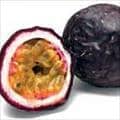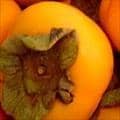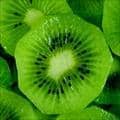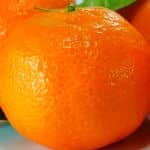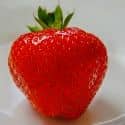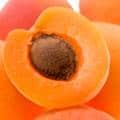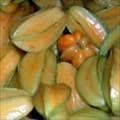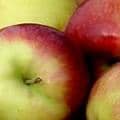All fruits are not created equal, and it's unfortunate they are often grouped into one single category. There is a huge difference with how your body responds to something like watermelon, which has almost no fiber, and raspberries which have loads of fiber. The glucose and insulin responses from these are very different. Fruits with decent fiber content are great, healthy, and good for your gut, and other fruits are fine occasionally as well.
Doctors, in general, have very little nutrition education, unless they have taken a very special interest in it and do some specialization. My bariatric dietician has been fully supportive of fruits from the very beginning as part of a plant-based diet, with the caveat that anything can be overdone and sticking to those that have more fibers is generally better to balance blood sugar and insulin response.
Here is a list of fruits and their fiber content:
List of Fruits High in Fiber
#1: Passion-Fruit (Granadilla)
Fiber
per Cup | Fiber
per 100g | Fiber
per 200 Calories |
|---|
25g
(88% DV) | 10g
(37% DV) | 21g
(77% DV) |
Nutrition Facts for Passion Fruit (Granadilla).(Source)
#2: Avocados
Fiber
per Avocado | Fiber
per 100g | Fiber
per 200 Calories |
|---|
13g
(48% DV) | 7g
(24% DV) | 8g
(30% DV) |
Nutrition Facts for Avocados.(Source)
#3: Guavas
Fiber
per Cup | Fiber
per 100g | Fiber
per 200 Calories |
|---|
9g
(32% DV) | 5g
(19% DV) | 16g
(57% DV) |
Nutrition Facts for Guavas.(Source)
#4: Raspberries
Fiber
per Cup | Fiber
per 100g | Fiber
per 200 Calories |
|---|
8g
(29% DV) | 7g
(23% DV) | 25g
(89% DV) |
Nutrition Facts for Raspberries.(Source)
#5: Blackberries
Fiber
per Cup | Fiber
per 100g | Fiber
per 200 Calories |
|---|
8g
(27% DV) | 5g
(19% DV) | 25g
(88% DV) |
Nutrition Facts for Blackberries.(Source)
#6: Pomegranate
Fiber
per Cup | Fiber
per 100g | Fiber
per 200 Calories |
|---|
7g
(25% DV) | 4g
(14% DV) | 10g
(34% DV) |
Nutrition Facts for Pomegranates.(Source)
#7: Persimmon
Fiber
per Fruit | Fiber
per 100g | Fiber
per 200 Calories |
|---|
6g
(22% DV) | 4g
(13% DV) | 10g
(37% DV) |
Nutrition Facts for Fuyu Persimmon.(Source)
#8: Kiwifruit
Fiber
per Cup | Fiber
per 100g | Fiber
per 200 Calories |
|---|
5g
(19% DV) | 3g
(11% DV) | 10g
(35% DV) |
Nutrition Facts for Kiwifruit.(Source)
#9: Pears
Fiber
per Cup | Fiber
per 100g | Fiber
per 200 Calories |
|---|
4g
(16% DV) | 3g
(11% DV) | 11g
(39% DV) |
Nutrition Facts for Pears.(Source)
#10: Oranges
Fiber
per Cup | Fiber
per 100g | Fiber
per 200 Calories |
|---|
4g
(15% DV) | 2g
(9% DV) | 10g
(36% DV) |
Nutrition Facts for Oranges.(Source)
#11: Blueberries
Fiber
per Cup | Fiber
per 100g | Fiber
per 200 Calories |
|---|
4g
(13% DV) | 2g
(9% DV) | 8g
(30% DV) |
Nutrition Facts for Blueberries.(Source)
#12: Tangerines
Fiber
per Cup | Fiber
per 100g | Fiber
per 200 Calories |
|---|
4g
(13% DV) | 2g
(6% DV) | 7g
(24% DV) |
Nutrition Facts for Tangerines.(Source)
#13: Strawberries
Fiber
per Cup | Fiber
per 100g | Fiber
per 200 Calories |
|---|
3g
(12% DV) | 2g
(7% DV) | 13g
(45% DV) |
Nutrition Facts for Strawberries.(Source)
#14: Cherries
Fiber
per Cup | Fiber
per 100g | Fiber
per 200 Calories |
|---|
3g
(12% DV) | 2g
(8% DV) | 7g
(24% DV) |
Nutrition Facts for Cherries (Sweet).(Source)
#15: Apricots
Fiber
per Cup | Fiber
per 100g | Fiber
per 200 Calories |
|---|
3g
(11% DV) | 2g
(7% DV) | 8g
(30% DV) |
Nutrition Facts for Apricots.(Source)
#16: Bananas
Fiber
per Cup Sliced | Fiber
per 100g | Fiber
per 200 Calories |
|---|
3g
(11% DV) | 3g
(9% DV) | 6g
(21% DV) |
Nutrition Facts for Bananas.(Source)
#17: Starfruit (Carambola)
Fiber
per Cup | Fiber
per 100g | Fiber
per 200 Calories |
|---|
3g
(11% DV) | 3g
(10% DV) | 18g
(65% DV) |
Nutrition Facts for Starfruit (Carambola).(Source)
#18: Apples
Fiber
per Cup | Fiber
per 100g | Fiber
per 200 Calories |
|---|
3g
(11% DV) | 2g
(9% DV) | 9g
(33% DV) |
Nutrition Facts for Apples.(Source)
#19: Mangos
Fiber
per Cup | Fiber
per 100g | Fiber
per 200 Calories |
|---|
3g
(9% DV) | 2g
(6% DV) | 5g
(19% DV) |
Nutrition Facts for Mangos.(Source)
#20: Grapefruit
Fiber
per Cup | Fiber
per 100g | Fiber
per 200 Calories |
|---|
3g
(9% DV) | 1g
(4% DV) | 7g
(25% DV) |
Nutrition Facts for Grapefruit.(Source)
There are several others that are at the 2g level such as nectarines, peaches, pineapple, plum, and cantelope.


